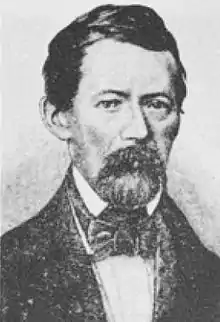Julius von Flotow
Julius von Flotow; full name- Julius Christian Gottlieb Ulrich Gustav Georg Adam Ernst Friedrich von Flotow (9 March 1788 – 15 August 1856) was a German military officer and a botanist specialized in lichenology and bryology.

Von Flotow was born in the village of Pitzerwitz (Pstrowice in Polish) in the region of Neumark. In 1813, he suffered a serious war injury at the Battle of Lützen, from which he never fully recovered and which led to a partial paralysis of his right arm. During a military campaign in France (1819), he took the opportunity to study lichens native to the Ardennes Mountains.[1] In 1850 he wrote of how his acquisition of a high-quality Schiek microscope enhanced his studies.[2] In an 1851 study of the crustose lichen Rimularia gibbosa, he introduced the term epithecium.[3] In 1832 he took an early retirement from the military and worked as a private scholar in Hirschberg. Among his written works are the following:
- Reisebericht über eine Excursion nach einem Theile des südöstlichen Riesengebirges (1836)
- Über Haematococcus Pluvialis (1844)
- Lichenes Florae Silesiae (1849–1850)
Von Flotow was a member of several learned societies, notably the Leopoldina and the Senckenberg Nature Research Society. He was a recipient of the Iron Cross and was awarded an honorary degree from the University of Breslau in 1856, a week before his death. The genus Flotovia from the botanical family Asteraceae is named in his honor.
See also
- Category:Taxa named by Julius von Flotow
References
- University of Gottingen, Search the Index Collectorum
- translated biography @ Brockhaus Encyclopedic Dictionary
- SCHLECHTENDALIA 23 Lichenology in Germany: past, present and future
- Flotow, J. von (1850). "Mikroskopische Flechtenstudien". Botanische Zeitung (Berlin) (in German). 8: 361–369.
- Mitchell, M.E. (2014). "De Bary's legacy: the emergence of differing perspectives on lichen symbiosis" (PDF). Huntia. 15 (1): 5–22 [14].
- International Plant Names Index. Flot.